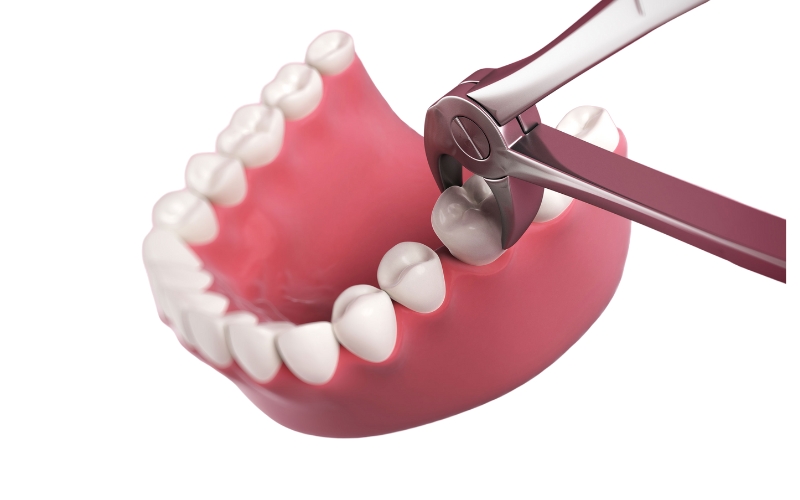
A painful illness called pericoronitis affects the gum tissue around a wisdom tooth that has partially erupted. If you’ve faced swelling, redness, and discomfort around your back teeth, you might be dealing with pericoronitis. While visiting a dentist for a proper diagnosis and treatment is always recommended, there are several things you can do at home to manage the symptoms and find relief.
In this blog, we’ll guide you through effective home remedies for treating pericoronitis and explain when tooth extractions may be the right solution.
What Is Pericoronitis?
Pericoronitis occurs when the gum tissue around a partially erupted tooth becomes inflamed and infected. This often happens with wisdom teeth that haven’t fully emerged from the gums, creating a flap of tissue that can trap food particles and bacteria. As a result, an infection can develop, causing pain and swelling.
Although pericoronitis typically affects wisdom teeth, it can occur with any tooth that’s partially erupted or impacted. The condition is more common in younger adults who are still growing their wisdom teeth.
1. Salt Water Rinses: A Simple Solution
One of the easiest ways to alleviate the pain and swelling of pericoronitis at home is by rinsing your mouth with warm salt water. Salt has natural antibacterial properties that help reduce inflammation and fight infection. Plus, the warm water can soothe the irritated area and help remove food debris.
How To Use Salt Water:
- Mix 1 teaspoon of salt in a glass of warm water.
- Swish the mixture around your mouth for 30 seconds to 1 minute.
- Spit it out, and repeat this several times a day, especially after meals.
Regular saltwater rinses can help manage the discomfort and keep the area clean until you can visit a dentist.
2. Over-the-Counter Pain Relief
To manage the pain and swelling associated with pericoronitis, you can take over-the-counter pain medications such as ibuprofen or acetaminophen. These medications can help reduce inflammation and provide temporary relief.
Be sure to follow the recommended dosage instructions, and consult with a healthcare professional if you have any concerns about taking these medications.
3. Cold Compress for Swelling
If your gums are swollen and painful, a cold compress can help reduce the swelling and numb the area. The cold temperature constricts blood vessels, which can decrease inflammation and ease the discomfort.
How to Use a Cold Compress:
- Wrap a few ice cubes in a clean cloth or use a cold pack.
- Apply the compress to the outside of your cheek near the affected area.
- Hold it for 15 to 20 minutes at a time, and repeat every few hours.
Using a cold compress is a simple and effective way to soothe the discomfort caused by pericoronitis.
4. Avoid Hard or Sticky Foods
When dealing with pericoronitis, it’s important to avoid hard, crunchy, or sticky foods that could irritate the swollen gums or get stuck in the flap of tissue. Stick to soft foods that are easy to chew and swallow, such as yogurt, soup, mashed potatoes, and smoothies.
Taking care of your diet will help prevent further irritation and give your gums a chance to heal.
5. Maintain Good Oral Hygiene
While it may be painful to brush around the affected area, maintaining good oral hygiene is crucial in managing pericoronitis. Gently brush your teeth, being careful around the swollen gum area. Use a soft-bristled toothbrush to avoid further irritation.
You can also use an antibacterial mouthwash to help reduce bacteria in your mouth and prevent infection. Just be sure to choose one that’s alcohol-free to avoid irritating your gums.
When Are Tooth Extractions Necessary?
In some cases, the pain and inflammation of pericoronitis may persist or become severe despite home treatments. If the condition doesn’t improve or if you experience recurrent incidents like this, a dentist may recommend a tooth extraction.
Tooth extractions in Metairie are often necessary when:
- The wisdom tooth is impacted and cannot fully emerge.
- There is a recurrent infection around the tooth.
- The flap of gum tissue is consistently trapping food and bacteria.
An extraction can help alleviate the pain and prevent future episodes of pericoronitis. While the idea of having a tooth extracted may sound daunting, a dentist will make the procedure as comfortable as possible.
Did you know that about 85% of people will develop pericoronitis due to impacted wisdom teeth? If you’re experiencing persistent pain around your wisdom teeth, it’s important to seek professional help before the condition worsens.
Take Action for Relief
Pericoronitis can be incredibly painful and uncomfortable, but there are several ways to manage the symptoms at home. Regular saltwater rinses, over-the-counter pain relief, cold compresses, and a soft food diet can provide temporary relief and help prevent further irritation.
However, if your symptoms persist or worsen, it’s essential to consult with our dentist. In some cases, tooth extractions may be necessary to prevent future issues and ensure long-term oral health.
Don’t let pericoronitis linger—take action now and find the relief you need!





